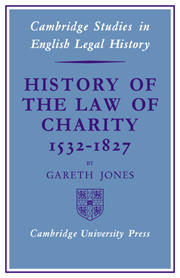Book contents
- Frontmatter
- Contents
- Preface
- List of Abbreviations
- Table Of Statutes
- Table Of Cases
- THE DEVELOPMENT OF THE LAW OF CHARITY 1532–1700
- THE DEVELOPMENT OF THE LAW OF CHARITY 1700–1827
- VI Introduction
- VII The Mortmain Act, 1736
- VIII The Preamble to the Charitable Uses Act, 1601, and the Definition of Charity
- IX The Influence of the Mortmain Act, 1736, on the Definition of Charity
- X The Development of the Law of Charity 1700–1827: The Privileges of Charity
- XI The Enforcement of Charitable Trusts 1700–1827
- Appendixes
- Index
- Frontmatter
- Contents
- Preface
- List of Abbreviations
- Table Of Statutes
- Table Of Cases
- THE DEVELOPMENT OF THE LAW OF CHARITY 1532–1700
- THE DEVELOPMENT OF THE LAW OF CHARITY 1700–1827
- VI Introduction
- VII The Mortmain Act, 1736
- VIII The Preamble to the Charitable Uses Act, 1601, and the Definition of Charity
- IX The Influence of the Mortmain Act, 1736, on the Definition of Charity
- X The Development of the Law of Charity 1700–1827: The Privileges of Charity
- XI The Enforcement of Charitable Trusts 1700–1827
- Appendixes
- Index
Summary
The charity statutes had been inspired by a national concern to encourage charitable giving and to protect from peculation and maladministration the funds of charity. With the cooperation of common law judges, the Chancellor bent the law to perfect the imperfect charitable gift and generously applied the cy-preès doctrine to prevent endowments from reverting into the uncharitable hands of the testator's heir or next-of-kin. After the Civil War, however, the commission procedure functioned less effectively. Men no longer warmly endorsed the aims of the Elizabethan legislature, and petitioners on behalf of charities turned for assistance to other procedures, such as the information, whose efficacy was less dependent upon the energy and enthusiasm of their neighbours.
This change of temper does not affect the substantive law until the beginning of the eighteenth century. It was traditional at one time to represent the years 1680 to 1760 as the dark age of English philanthropy. Lecky's England was an England where the poor were depicted as contentedly wallowing in their own, self-imposed degradation and where the charitable impulse was dismissed as unworthy of any responsible pater familias. This highly coloured representation ignored the presence of virile philanthropic forces operating through mechanisms and techniques different from those of a century earlier. Only a detailed statistical analysis, comparable to that undertaken by Professor Jordan in his Philanthropy in England, 1480–1660, can show how representative were such enlightened souls as Richard Taunton and Hannah Moore. The legal evidence, at least, suggests that an influential segment of the community, the judiciary and legal profession, remained suspicious of the worth of charity and resentful of the death-bed gift which disinherited the testator's heir-at-law and next-of-kin.
- Type
- Chapter
- Information
- History of the Law of Charity, 1532-1827 , pp. 105 - 108Publisher: Cambridge University PressPrint publication year: 1969



